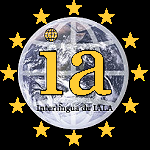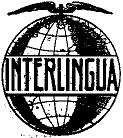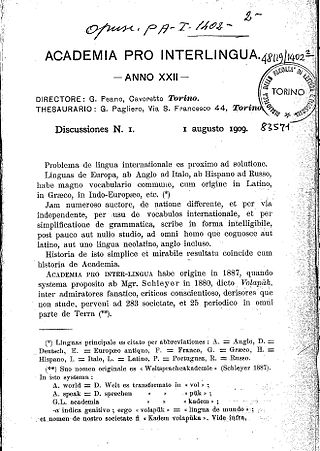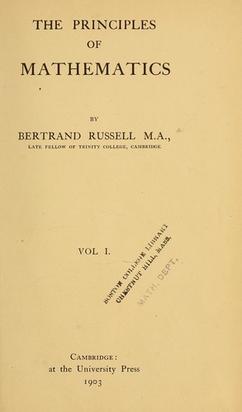
Giuseppe Peano was an Italian mathematician and glottologist. The author of over 200 books and papers, he was a founder of mathematical logic and set theory, to which he contributed much notation. The standard axiomatization of the natural numbers is named the Peano axioms in his honor. As part of this effort, he made key contributions to the modern rigorous and systematic treatment of the method of mathematical induction. He spent most of his career teaching mathematics at the University of Turin. He also wrote an international auxiliary language, Latino sine flexione, which is a simplified version of Classical Latin. Most of his books and papers are in Latino sine flexione, others are in Italian.

Interlingua is an international auxiliary language (IAL) developed between 1937 and 1951 by the American International Auxiliary Language Association (IALA). It ranks among the most widely used IALs and is the most widely used naturalistic IAL – in other words, those IALs whose vocabulary, grammar, and other characteristics are derived from natural languages, rather than being centrally planned. Interlingua literature maintains that (written) Interlingua is comprehensible to the hundreds of millions of people who speak Romance languages, though it is actively spoken by only a few hundred.
In mathematical logic, the Peano axioms, also known as the Dedekind–Peano axioms or the Peano postulates, are axioms for the natural numbers presented by the 19th century Italian mathematician Giuseppe Peano. These axioms have been used nearly unchanged in a number of metamathematical investigations, including research into fundamental questions of whether number theory is consistent and complete.
An international auxiliary language is a language meant for communication between people from all different nations, who do not share a common first language. An auxiliary language is primarily a foreign language and often a constructed language. The concept is related to but separate from the idea of a lingua franca that people must use to communicate.

Latino sine flexione, Interlingua de Academia pro Interlingua or Peano's Interlingua, is an international auxiliary language compiled by the Academia pro Interlingua under chairmanship of the Italian mathematician Giuseppe Peano (1858–1932) from 1887 until 1914. It is a simplified version of Latin, and retains its vocabulary. Interlingua-IL was published in the journal Revue de Mathématiques in an article of 1903 entitled De Latino Sine Flexione, Lingua Auxiliare Internationale, which explained the reason for its creation. The article argued that other auxiliary languages were unnecessary, since Latin was already established as the world's international language. The article was written in classical Latin, but it gradually dropped its inflections until there were none.
Controlled natural languages (CNLs) are subsets of natural languages that are obtained by restricting the grammar and vocabulary in order to reduce or eliminate ambiguity and complexity. Traditionally, controlled languages fall into two major types: those that improve readability for human readers , and those that enable reliable automatic semantic analysis of the language.
Idiom Neutral is an international auxiliary language, published in 1902 by the International Academy of the Universal Language under the leadership of Waldemar Rosenberger, a St. Petersburg engineer.

The Academia pro Interlingua was an organization dedicated to the promotion of international auxiliary languages, and is associated in particular with Prof. Giuseppe Peano's language Latino sine flexione.

Louis Couturat was a French logician, mathematician, philosopher, and linguist. Couturat was a pioneer of the constructed language Ido.
Interlingua is an auxiliary language developed by the International Auxiliary Language Association.
Esperanto II or Esperanto 2 was a reform of Esperanto proposed by René de Saussure in 1937, the last of a long series of such proposals beginning with a 1907 response to Ido with a project called Lingwo Internaciona, later called Antido 1. Esperanto II was one of several languages investigated by the International Auxiliary Language Association, the linguistic research body that eventually standardized and presented Interlingua de IALA.

Mario Pieri was an Italian mathematician who is known for his work on foundations of geometry.

Hubert Collings Kennedy is an American author and mathematician.

The Principles of Mathematics (PoM) is a 1903 book by Bertrand Russell, in which the author presented his famous paradox and argued his thesis that mathematics and logic are identical.
The International Academy of Volapük was a ruling body established at the second Volapük congress in Munich in August 1887 with the goal of preserving and improving Volapük.
The mathematical manuscripts of Karl Marx are a manuscript collection of Karl Marx's mathematical notes where he attempted to derive the foundations of infinitesimal calculus from first principles.

The 1889 treatise Arithmetices principia, nova methodo exposita by Giuseppe Peano is a seminal document in mathematical logic and set theory, introducing what is now the standard axiomatization of the natural numbers, and known as the Peano axioms, as well as some pervasive notations, such as the symbols for the basic set operations ∈, ⊂, ∩, ∪, and A−B.

Enrico D'Ovidio (1842-1933) was an Italian mathematician who is known by his works on geometry.
Interlingue and Interlingua are constructed international auxiliary languages.








